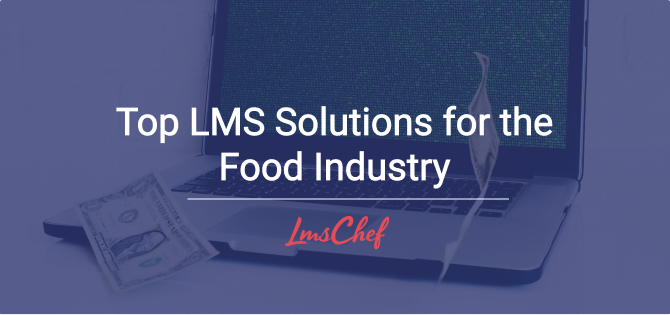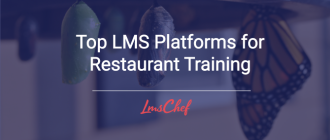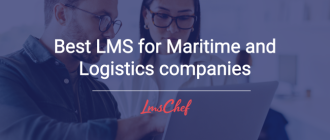When it comes to the food industry, selecting the best LMS for food industry is vital for effective training and regulatory compliance. This article pinpoints the best learning management systems specifically designed for this sector’s unique needs. Expect a straightforward rundown of top platforms, complete with critical features that matter most, like scalability and customization, all to lead you to an informed choice for your business.
Key Takeaways
- An LMS streamlines the training process in the food and beverage industry, enhancing knowledge retention and employee skills, while ensuring compliance with food safety standards and reducing training costs.
- Key features of an LMS for the food and beverage sector include mobile learning capabilities, customizable training content, and in-depth user management and progress tracking to accommodate the unique needs of businesses.
- Successful LMS implementations have resulted in substantial benefits such as decreased turnover rates, improved compliance, and reduced training costs, as evidenced by real-world case studies.
Why Your Food and Beverage Business Needs an LMS
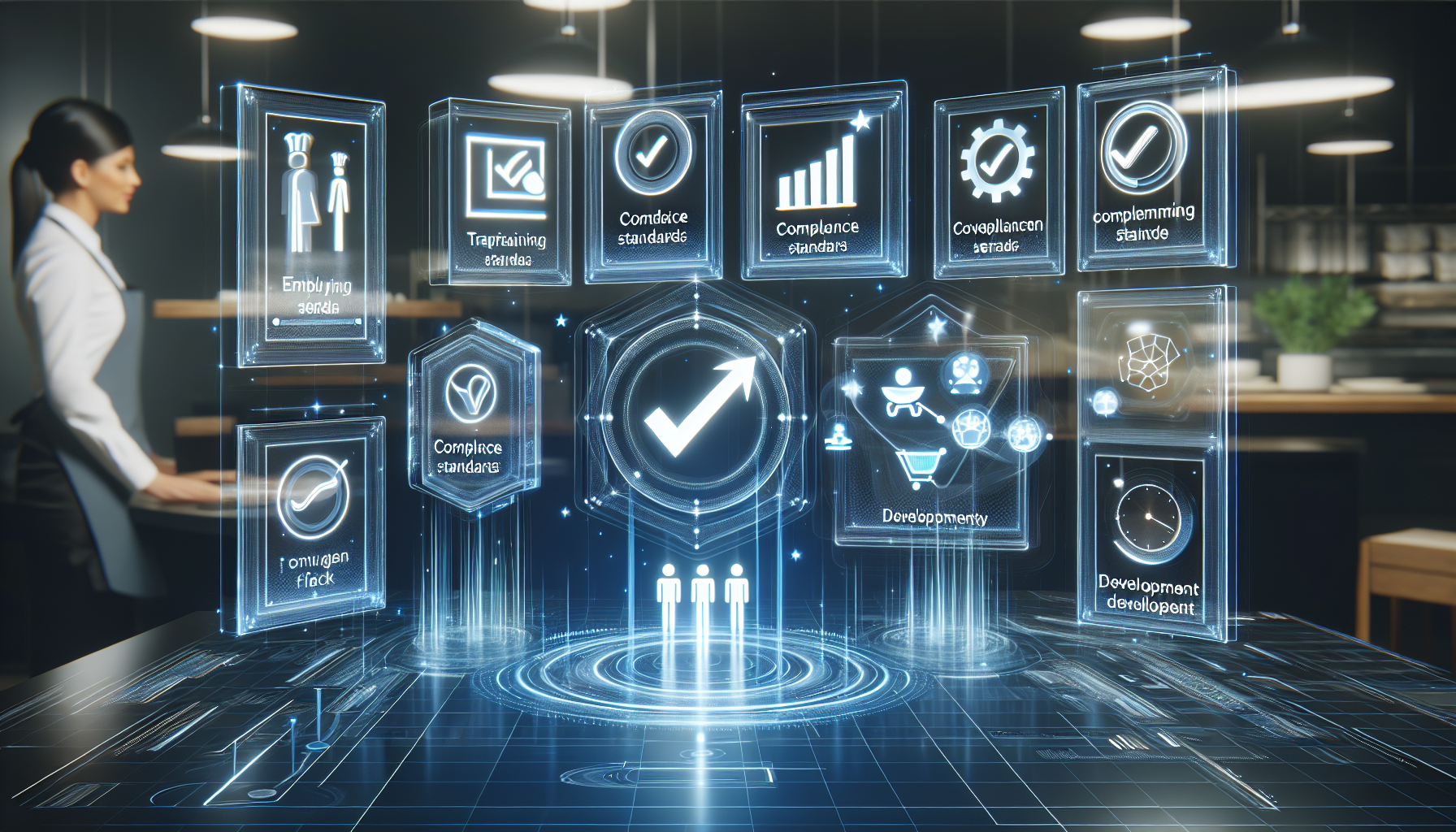
Knowledge is a powerful tool in the food and beverage industry. From understanding the finer nuances of food safety regulations to staying updated on the latest culinary trends, your employees need to constantly keep learning. But conducting regular training sessions can be time-consuming and logistically challenging, especially if your teams are spread across various locations. This is where a learning management system (LMS) steps in.
An LMS provides a platform for uniform training and knowledge dissemination throughout your organization, regardless of location. It fosters an inclusive work culture where everyone’s on the same page, ensuring that your staff, whether they’re in the kitchen, on the floor, or in the boardroom, are well-equipped with the knowledge they need to excel in their roles. And it’s not just about seamless dissemination of information. A well-implemented LMS can also lead to higher employee retention rates of training information, enhancing the overall learning experience.
Boosting Employee Skills and Knowledge
The food and beverage industry is fast-paced and ever-evolving. To keep up with these changes, your employees need to update their skills and knowledge continually. An LMS caters to this need by offering personalized employee training experiences tailored to different roles and learning styles. With an LMS, you can:
- Deliver courses to individuals or teams
- Enrich courses with interactive elements like quizzes and gamified features
- Make learning an engaging and rewarding process
A well-designed LMS can:
- Keep employees abreast of the most recent changes in company procedures and training needs
- Facilitate an inclusive work culture where everyone stays abreast of the latest developments
- Create a more knowledgeable and empowered workforce
- Deliver superior customer experiences
- Lead to a significant increase in training completion rates.
Ensuring Compliance with Food Safety Standards
Compliance with food safety standards is a mandatory requirement in the food and beverage industry. An LMS can help you ensure that all employees are adequately trained and compliant with these standards, thus minimizing the risk of food safety incidents. An LMS like Learnexus provides standardized learning materials on critical topics such as FDA regulations, ensuring every team member receives high-quality and consistent training.
As a result, this leads to:
- an increase in compliance
- a decrease in food safety incidents
- improved quality control
- better customer satisfaction
But that’s not all. An LMS also offers:
- Certification tracking and compliance monitoring features, including automatic reminders and reporting, which helps to maintain and demonstrate compliance with food safety regulations.
- Content updates in alignment with the latest culinary trends, food safety regulations, and industry standards.
- A comprehensive approach to compliance management that not only ensures adherence to safety standards but also enhances the overall effectiveness of your training efforts.
Reducing Training Costs and Time
Training employees, especially in the context of training restaurant employees, can be a significant expense for businesses in the food and beverage industry. From printed materials to travel costs for in-person sessions, the expenses can quickly add up. However, these costs can be significantly lowered with an LMS. For instance, Subway achieved a 60% decrease in employee training expenses by implementing training programs through an LMS, eliminating traditional in-person costs like printed materials and travel.
But it’s not just about cost savings. Implementing an LMS can also save time by streamlining your training processes. With automation features that integrate health and safety training, an LMS can significantly reduce the time spent on training. Plus, the comprehensive reporting and analytics provided by an LMS allow businesses to identify training program strengths and areas needing improvement, making training more effective.
Key Features to Look for in an LMS for the Food Industry
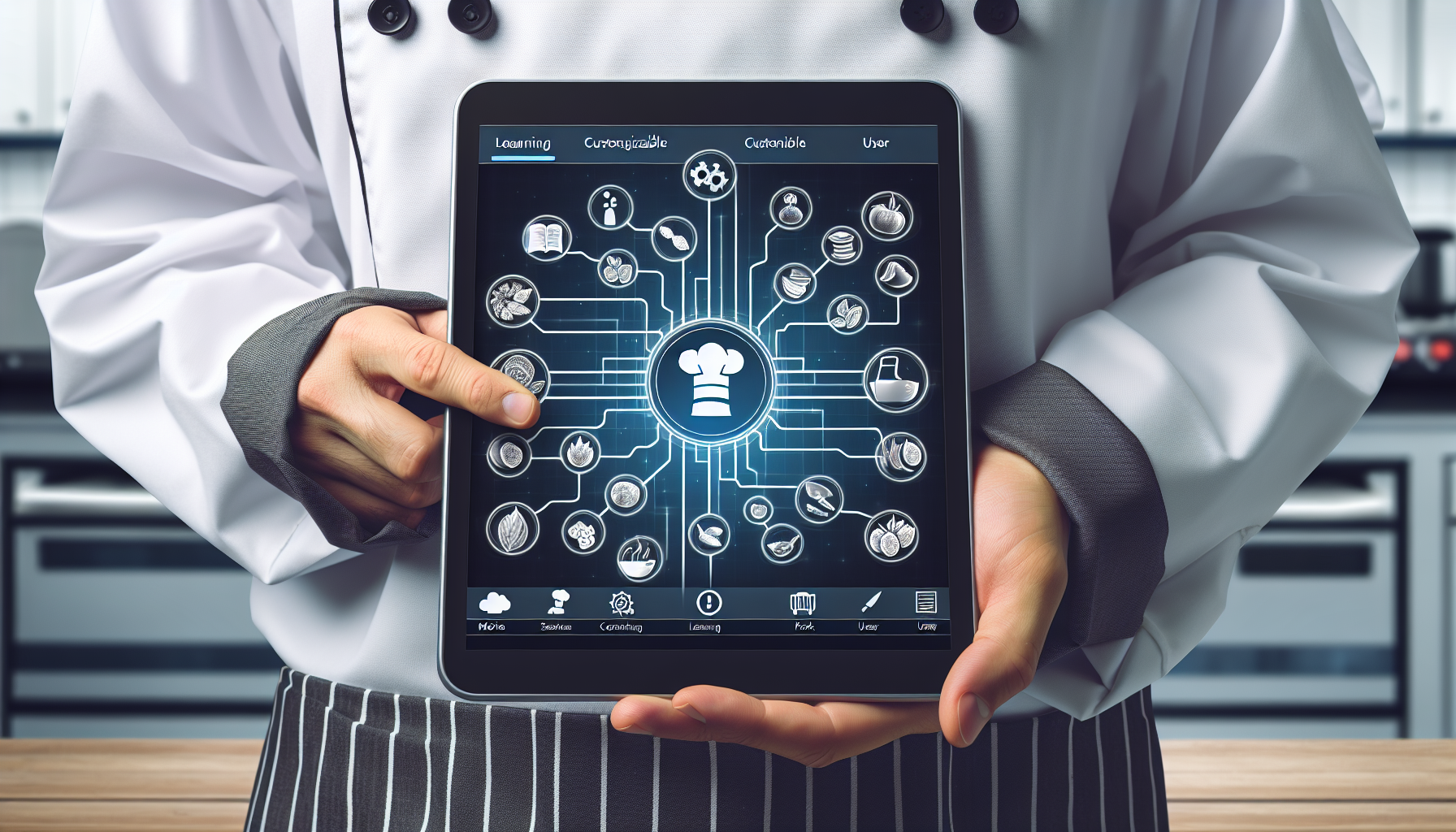
Having discussed the necessity of an LMS for your food and beverage business and its benefits, let’s outline the essential features to seek in an LMS for your business. While the specific needs may vary from one business to another, there are certain features that are particularly important for the food and beverage industry, including mobile learning capabilities, customizable content, and user management and progress tracking.
A mobile-compatible LMS is crucial as it allows your employees, who may not regularly use desktop computers, to access and deliver online training courses from their devices. This feature is particularly beneficial for staff who are always on-the-go, such as restaurant servers or delivery drivers, making online training courses more accessible and convenient.
Customizable content allows the training materials to be specifically designed for your company’s products, safety rules, and operating procedures. And, user management and progress tracking features enable efficient organization and data-driven decision-making. With our platform, you can easily access training materials tailored to your needs.
Mobile Learning Capabilities
In the digital era, learning on the move provides a tremendous advantage. A mobile-compatible LMS facilitates this, allowing staff to use familiar devices for training. This not only increases accessibility but also leads to a significant increase in employee productivity. For example, mobile LMS in restaurants led to a 34% increase in employee productivity.
The use of a mobile LMS offers several benefits, including:
- Easy scalability to new restaurant locations without significant investments in IT infrastructure
- Learning that is not confined to a desk, promoting continuous on-demand learning
- Generating greater enthusiasm among Gen Z employees
Mobile-responsive platforms like Paradiso Solutions LMS can help you achieve these benefits by creating your own learning platform.
Customizable Training Content
Diversity and dynamism define the food and beverage industry. Whether it’s a new recipe, a different cooking technique, or a change in food safety regulations, there’s always something new to learn. To cater to these changing needs, an LMS must offer customizable training content.
From creating individual learning paths that cater to the diverse needs of employees to including a variety of training formats like videos, podcasts, and interactive quizzes, an LMS should allow for a personalized training experience. Collaborating with subject matter experts during course development can ensure that the content is not only accurate and current but also adheres to the latest industry standards.
User Management and Progress Tracking
Efficient user management is essential for the seamless operation of an LMS. This includes creating unique user roles, groups based on team, role, or location, and enabling customization of user permissions. This ensures an efficient reflection of the organizational structure and simplifies the management of users on the platform.
Progress tracking is another critical feature of an LMS. Comprehensive tracking and reporting capabilities provide a clear snapshot of training completion, employee progress, and knowledge retention. Built-in reporting and analytics are essential for enabling data-driven decision making by assessing team progress and performance.
In short, learning management systems, also known as learning management software, with robust user management and progress tracking capabilities can help ensure comprehensive learning within the food industry.
Top LMS Solutions for the Food and Beverage Industry
The myriad of available LMS solutions can make the selection process daunting. However, some LMS solutions have distinguished themselves as particularly well-suited to the unique needs of the food and beverage industry. These include Learnexus, TalentLMS, and Paradiso Solutions, each offering a distinct set of features and benefits.
Keep in mind that LMS software solutions can adopt various formats such as:
- Cloud-based (SaaS)
- Self-hosted
- Desktop applications
- Mobile applications
Each comes with its own set of advantages and requires different levels of programming expertise to customize the system to a company’s specific needs. The pricing strategies for LMS systems also vary, enabling businesses to choose the model that aligns with their budget constraints and usage requirements.
Learnexus LMS
Among the top LMS solutions for the food and beverage industry, Learnexus stands out for its industry-specific features. Designed with mobile compatibility, customizable content, and extensive tracking and reporting features, Learnexus caters to the unique needs of the food and beverage industry.
Providing focused support for the food and beverage sector, Learnexus addresses the unique challenges this industry faces with training and compliance. Its user-friendly interface enhances the experience for both the training administrators and the employees, simplifying the overall training process.
TalentLMS
TalentLMS offers a flexible learning management system, known as restaurant lms, tailored for the dynamic needs of the food and beverage industry. It enables the creation of new courses or editing existing ones to ensure that training material is current and relevant for restaurant chains and food handlers.
What makes TalentLMS stand out is its adaptability. It caters to a wide range of learning styles and preferences, from visual learners who benefit from video content to hands-on learners who prefer interactive quizzes and tests. This flexibility ensures that every user gets the most out of the learning experience.
Paradiso Solutions LMS
Paradiso Solutions LMS features an AI-powered authoring tool that facilitates the effortless creation of engaging courses. Its training content can be customized to match the specific recipes, techniques, and standards needed for various food and beverage businesses including restaurants and cafes.
In addition to its customization capabilities, Paradiso Solutions LMS offers:
- Scalable solutions that can adapt to a business’s growth, allowing accommodation for new courses and evolving training needs
- Comprehensive user management features that enable progress tracking and informed decisions
- Seamless system integration
Implementing an LMS in Your Food and Beverage Business
Having examined the advantages of an LMS and the features to consider, it’s time to discuss an LMS implementation in your food and beverage business. Implementing an LMS involves several key steps, starting with establishing clear implementation goals and timelines. This is crucial for the smooth integration of an LMS, ensuring minimal interruption to your business’s daily activities.
An LMS offers scalable benefits to businesses of all sizes within the food and beverage sector, aiding in the creation and customization of training courses. However, to successfully implement an LMS, ongoing support is essential. This will facilitate efficient employee onboarding and resolve any emerging issues. A cross-functional team can contribute diverse insights and promote organization-wide buy-in during the LMS implementation and employee onboarding processes.
Employee Onboarding
Employee onboarding plays a critical role in the successful implementation of an LMS in your food and beverage business. Assessing training needs and objectives is fundamental for creating an effective LMS onboarding plan specific to the food and beverage industry, helping staff to understand which skills and knowledge they need to develop.
Employees are more likely to engage with an LMS when they comprehend its features and benefits, which can be achieved through a clear onboarding explanation.
To ensure employees are comfortable using the LMS regularly, the following steps are recommended:
- Provide hands-on training sessions or walkthroughs.
- Conduct regular feedback sessions to identify any difficulties employees face with the LMS.
- Address any issues promptly to maintain accountability.
Course Creation and Customization
After onboarding your employees, the subsequent step in LMS implementation is the creation and customization of courses. Customizing courses to align with the specific brand, culture, and operational practices of the business improves the training’s relevance and impact.
Ensuring that training materials are modular and adaptable is crucial. This enables swift updates and adjustments to keep up with the evolving needs of the industry. Integrate a variety of formats such as simulations, case studies, and demonstrations in course design to cater to different learning styles and make training engaging for employees.
System Integration
System integration marks the last stage of LMS implementation. Seamless integration with existing systems like Salesforce CRM, point-of-sale systems, and inventory management software enhances workflows and aligns training with real-time operational data.
Features of an LMS include:
- Single Sign-On, which enhances user convenience by providing access to the LMS with just one set of credentials
- Dynamic rules, which enable automation of course enrollments, user group assignments, and notifications
- Ongoing assessment and refinement of integrations between the LMS and other business systems, which are essential in adapting to changing technology and business needs, ensuring that the training program remains effective.
Success Stories: LMS in Action
Observing the practical implementation of an LMS can truly bolster your belief in its efficacy. Let’s look at some success stories of LMS implementation in the food industry. These stories illustrate how LMS has reduced turnover rates, improved compliance management, and decreased training costs for restaurant chains and food manufacturers, providing real-world evidence of the benefits of an LMS.
From mitigating turnover costs to ensuring compliance, these success stories underscore the transformative impact an LMS can have on a food and beverage business. They also provide valuable insights for other businesses that may be considering implementing an LMS.
Restaurant Chain Case Study
The restaurant industry often grapples with high turnover rates, resulting in substantial expenses for businesses. For the Wisconsin Hospitality Group, managing 118 restaurants and training approximately 5,000 new hires annually due to high turnover rates was a daunting task.
That’s when they decided to implement an LMS. The result? The Applebee’s restaurants under WHG saw an 11 percent drop in turnover, leading to significant annual savings on training costs. The overall cost of onboarding and training a new employee in WHG’s restaurant chain was reduced by 15 percent through the adoption of an LMS. This case study underscores the profound impact an LMS can have on reducing training costs and improving employee retention in the restaurant industry.
Summary
In the dynamic world of the food and beverage industry, staying ahead of the curve means continually learning and adapting. And a Learning Management System (LMS) can play a pivotal role in this process. From boosting employee skills and knowledge to ensuring compliance with food safety standards and reducing training costs and time, an LMS can help your food and beverage business soar to new heights.
Whether it’s mobile learning capabilities, customizable content, user management, or progress tracking, the right LMS can offer a plethora of benefits tailored to the unique needs of your business. So, are you ready to embrace the power of learning with an LMS and take your food and beverage business to the next level?
Frequently Asked Questions
What is the most widely used LMS?
Blackboard Learn is the most widely used LMS, catering to businesses, governments, educational institutions, as well as employee training.
What is LMS in food?
An LMS in food refers to a learning management system which is a virtual library of educational content used by organizations to train employees on topics like company policies, cleaning procedures, and food safety training. Common examples of LMS’s include Cornerstone, Saba, Wisetail, and Litmos.
What is LMS in restaurant?
LMS in a restaurant refers to Learning Management System, which is a specialized software designed to train restaurant staff and track their engagement with training materials for recognition and praise.
Which type of LMS is best suited?
It’s important to consider your specific needs and requirements before choosing a Learning Management System.
How can an LMS improve employee skills and knowledge in the food and beverage industry?
By offering personalized training tailored to different employee roles and learning styles, an LMS can enhance employee skills and knowledge in the food and beverage industry and improve knowledge retention and application.

